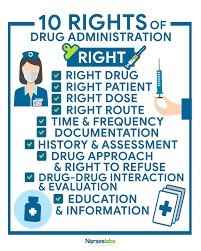A nurse administers an incorrect dose of medication to a client. The nurse recognizes the error immediately and completes an incident report. Which of the following facts related to the incident should the nurse document in the client's medical record?
Completion of the incident report
Time the medication was given
Reason for the medication error
Notification of the pharmacist
The Correct Answer is B
A is incorrect because the completion of the incident report should not be documented in the client's medical record, but in a separate file for quality improvement purposes.
B is correct because the time the medication was given is an essential fact related to the incident that should be documented in the client's medical record.
C is incorrect because the reason for the medication error should not be documented in the client's medical record, but in the incident report for analysis and prevention of future errors.
D is incorrect because the notification of the pharmacist should not be documented in the client's medical record, but in the incident report for follow-up and corrective actions.

Nursing Test Bank
Naxlex Comprehensive Predictor Exams
Related Questions
Correct Answer is A
Explanation
A. Performing gastrostomy feedings through an established gastrostomy tube is within the scope of practice for an AP, as it is a routine, non-complex task.
B. Evaluating the effectiveness of pain medication requires assessment skills, which fall under the nurse’s scope of practice.
C. Providing client care instructions requires nursing judgment and should be done by the nurse.
D. Teaching a client how to measure their blood pressure involves client education, which is the nurse’s responsibility.
Correct Answer is D
Explanation
Choice A rationale:
Hyperthyroidism is not a contraindication for niacin use. Niacin is used to lower LDL cholesterol levels and has no specific contraindications related to thyroid disorders.
Choice B rationale:
Asthma is not a contraindication for niacin use. Niacin does not interact with asthma medications or worsen asthma symptoms, so it is not contraindicated in individuals with asthma.
Choice C rationale:
High blood pressure is not a contraindication for niacin use. In fact, niacin can help lower blood pressure and improve overall cardiovascular health. It is often prescribed to individuals with high blood pressure and elevated cholesterol levels.
Choice D rationale:
Active liver disease is a contraindication for niacin use. Niacin can cause liver damage, and individuals with active liver disease should avoid niacin therapy to prevent further harm to the liver. Monitoring liver function tests is crucial in patients taking niacin to ensure their liver health.
Whether you are a student looking to ace your exams or a practicing nurse seeking to enhance your expertise , our nursing education contents will empower you with the confidence and competence to make a difference in the lives of patients and become a respected leader in the healthcare field.
Visit Naxlex, invest in your future and unlock endless possibilities with our unparalleled nursing education contents today
Report Wrong Answer on the Current Question
Do you disagree with the answer? If yes, what is your expected answer? Explain.
Kindly be descriptive with the issue you are facing.
